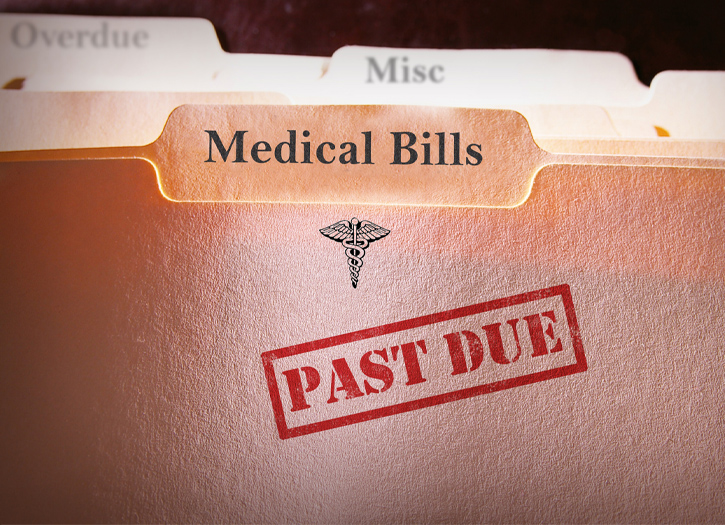When you’re facing a medical emergency, the last thing you want to think about is the financial implications, but unfortunately, you’re often left with no choice.
That’s why, if you have a situation like a car accident leading to serious injuries, you should never sign anything from the insurance company without talking to a lawyer. You may end up needing significantly more care than what you initially think, and you may be left covering those expenses if you settle with an insurance company too soon.
Aside from accident injuries, there are so many other situations that can lead to significant medical bills.
In the U.S., Americans spent $3.6 trillion on medical care in 2018 alone. The average health care cost per person was $11,172.
In the next few years, due to the COVID-19 pandemic, these costs may affect even more people.
If you’re facing medical bills that feel out of control, the following are important things to know.
What to Do If You Can’t Afford Your Medical Bills
It’s very easy for the cost of one illness or accident to end up being five figures. Even when you have health insurance, your out-of-pocket costs can be staggering.
If you don’t pay your medical bills, it can lead to negative effects on your credit history and other consequences.
You do have to pay them or work something out, but if you don’t think you can, take the following steps first and foremost:
- Go through every bill to make sure the charges are accurate. You may be surprised at how many inaccuracies there are in medical bills. By going through them carefully and disputing inaccurate charges, you can save yourself hundreds or thousands of dollars. For example, if you had a hospital stay and you go through your bills, you might find that you were charged for a full day even when you checked out or for medications you never took.
- Don’t ignore the bills. The worst thing you can do is ignore your medical bills. They’ll get sent to collections, and you may end up doing damage to your credit score that takes you years to ultimately dig yourself out of.
- If you can avoid it, try not to use credit cards to pay medical bills. The only exception might be if you have a card with a no-interest period.
- Work out a payment plan. Much like checking for inaccuracies, you might view the idea of working out a payment plan as a waste of time. You might think the providers or hospital won’t be willing to work with you, but chances are they will. When you work out a payment plan as opposed to paying bills with a credit card, you’re going to get interest-free options. You can negotiate, and if you can’t make a certain payment amount, don’t be afraid to tell the billing representative what you can afford.
- Ask for discounts when you’re negotiating. For example, some providers will give you a discount if you pay a larger amount of your bill at one time.
- A lot of hospitals and medical companies have financial assistance programs available, but you’ll have to fill out paperwork and show your income and other financial information.
Are There Medical Bankruptcies?
There is the term “medical bankruptcy” that’s often used in these situations. While you might end up filing bankruptcy because of medical bills, there’s not a specific category for that.
Also, even if you file bankruptcy to deal with your medical debt, the case won’t just cover that particular debt.
In these situations, medical debt is viewed the same as any other kind of debt, including personal loans and credit card debt.
No matter what ultimately led you to need to file for bankruptcy, you’re going to have to list everything including all debts, real estate and personal property.
It’s estimated that around two-thirds of people who file for bankruptcy cite medical issues as one of the big contributors to their situation.
If you have to file bankruptcy because of medical expenses or any other reason, there are two main options. There’s chapter 7 bankruptcy, first.
With chapter 7 bankruptcy, the process will usually last no more than six months, and you should receive forgiveness or discharge of your debts when the process is finished.
Not all debts will be dischargeable. For example, child support won’t be discharged.
There’s also chapter 13 bankruptcy, which is a repayment plan. Under chapter 13 bankruptcy, you’re usually given anywhere from three to five years to repay your debt. There are benefits to this type of bankruptcy, even though there might not sound like it. For example, you’re probably going to end up paying significantly less than what you owe because the payment is based on your debts and income.
How Does This Happen?
You may be wondering how, especially for someone with medical insurance, their health care bills can lead to financial problems or even bankruptcy. It is typically the result of inadequate health insurance.
Health insurance is incredibly expensive, and the cheaper plans, while still costly, often have high out-of-pocket limits. It can be thousands of dollars that you have to pay out-of-pocket before your health insurance even kicks in.
Many people simply don’t have this kind of cash sitting aside for unexpected emergencies.
When you face even a relatively small but unexpected expense, it can quickly spiral into a worse financial situation, and there tends to be a ripple effect.
When you do have the opportunity to choose a health insurance plan, it’s important to think long-term. Some people make the mistake of just wanting the cheapest option at any moment, and then they ultimately find themselves facing a medical emergency and paying much more than they have out-of-pocket.
If you aren’t currently facing a medical debt crisis, then you still have the opportunity to avoid this. You can make sure your health insurance meets your needs and also try to set a goal to create an emergency fund of cash. Ideally, it should be as much as your out-of-pocket limit.







Add Comment